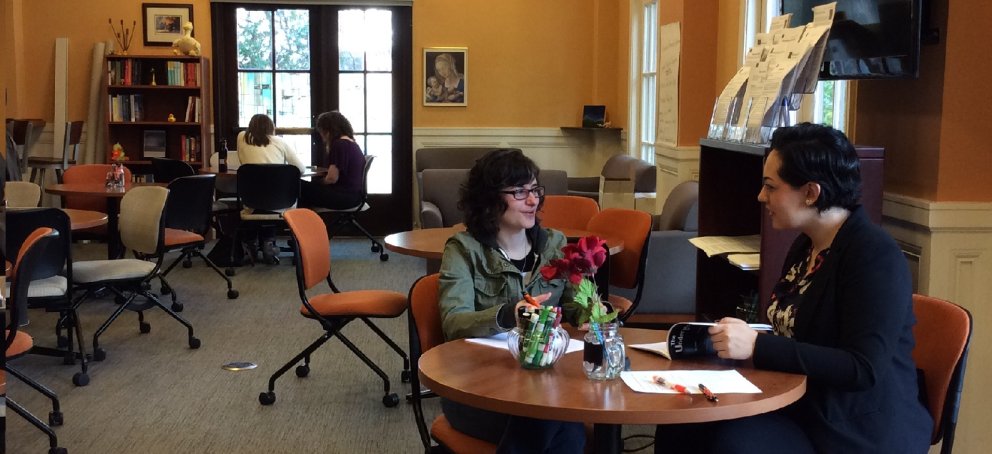Being a CWAC Adviser

A Writing Adviser is a service-learning position through which a student develops their own writing and empathic skills, learn new ways to view the world, and share their writing expertise with peers.
Advisers are involved with efforts in Writing Across the Curriculum through their 1-1 work with peers of all disciplines, their facilitation of small group work, and their leadership of writing workshops.
If you would like to apply, be sure to register for the Writing Adviser Training Course (CWAC 200) before the start of the semester.
Minimum Requirements

Application process
- Exemplary work and dedication to collaboration during CWAC 200 or 661
- Reflective letter of application
Commitment
- Work 6 to 20 hours per week
- Ongoing enrollment in 1-unit Weekly Staff Workshop: CWAC 201 or 501
Abilities & Skills
- Solid grasp of grammar and various forms of writing
- Punctuality and dependability
- Empathy and interest in why others write the way they do
50% Service
- Advising peer student writers 1-1, guiding them toward discovering what they want to express and the best means of that expression, given the demands of purpose and audience, via both drop-in and appointment sessions
- Creating and presenting workshops tailored to specific writing needs of courses across the disciplines
50% Learning
- Preparing for weekly Staff Workshops
- Conducting and observing peer sessions with fellow staff members and sharing feedback
- Developing strategies to use during sessions to help peers diagnose grammatical issues, conduct research, analyze texts, and write at all stages of the process
- Working on staff projects and creating resources for peer writers
- And learning about styles of writing across disciplines.
Perks of Being a CWAC Adviser
Since we are such a small community of student workers, everyone who works at CWAC has the opportunity to be a leader. Each person at CWAC is treated as an equal, and our weekly workshops allow everyone's voices to be heard. As part of our ongoing training, all advisers observe others' sessions and are observed by each other. Through discussion of our successes and failures on an equal playing field, we make collaborative decisions and grow together.
We also offer distinct leadership positions within the Center. Some examples are listed below.
Lead Advisers: Lead Writing Advisers are role models who mentor other Writing Advisers by observing sessions and giving detailed feedback, as well as offering resources to Advisers and being the “go-to” for all sorts of questions. The Leads help the Director with training, including for the Grammar Resources Test and for various Staff Workshops. The Leads also help the Director manage workflow. The Leads are in charge when the Director is not in the Center. Leads often operate the desk and often manage project teams. The Leads communicate often, openly, and quickly with the Director.
Workshops: All advisers have the opportunity to design and present our various workshops in classrooms across campus. Facilitating workshops helps to develop public speaking skills, organizational skills, time management, and creativity.
Our spirit of collaboration permeates everything we do. As a community of equals, we all work together to promote the joys of writing... and have fun doing it!
Here are some responses from current and former advisers from our annual anonymous staff survey:
"Being open to constructive criticism and being attentive to the success of others are two of the most important qualities that go into fostering a supporting and welcoming CWAC community."
"From the moment I came in, I felt like I had a new group of friends here. Veteran advisers make the effort to reach out to new advisers and help them out as well as draw them into conversation."
"I think the philosophies that underlie how we conduct sessions extend (in their own way) to the CWAC environment as a whole; people involved in the center are open-minded, helpful, and always willing to treat each other as peers."
The 1-unit classes that train advisers are service-learning courses. Through our work at CWAC, we serve the Saint Mary's College community, and in doing so, we learn about ourselves. We approach every session as a learning opportunity; the author is the expert on the topic, and we are here to engage in collaborative discussion. Through reflection and collaboration, we use our service to learn from our community.
From our Course Evaluations: What have you learned from your service experience?
"That... reflecting upon your interactions can teach you things you never knew about yourself."
"I learned about my strengths and weaknesses, which led me to reflect on my chosen career path."
"Time management, creativity, and collaboration."